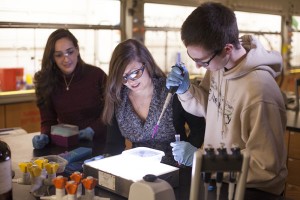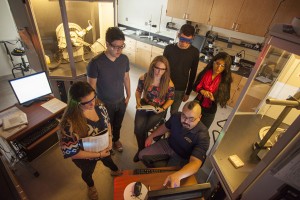Chemistry ranked as one of the nation’s best undergrad programs
The department ranks in the top four percent of programs nationally in graduation of ACS-certified bachelor’s degree chemistry graduates, and is the top producer of ACS-certified bachelor’s degree chemistry graduates in New Jersey.

 Unlike its counterparts at many other schools, TCNJ’s chemistry department is facing what Chairperson David Hunt calls “a pleasurable problem to have.” It seems there are more qualified students trying to enroll in the program than the department can accommodate.
Unlike its counterparts at many other schools, TCNJ’s chemistry department is facing what Chairperson David Hunt calls “a pleasurable problem to have.” It seems there are more qualified students trying to enroll in the program than the department can accommodate.
But it’s not just potential students who have taken note of the department. A group of national experts that recently completed a yearlong review of the program used words like “extraordinary” and “remarkable” to describe what is happening in TCNJ’s chemistry program. “The department is poised to capture national attention,” their report indicated.
In fact, it already has. The department now ranks in the top four percent of chemistry programs nationally — 23rd out of 653 in the U.S. — in graduation of American Chemical Society (ACS) certified bachelor’s degree chemistry graduates, and is the top producer of ACS-certified bachelor’s degree chemistry graduates in New Jersey.
Hunt said a “confluence of events” that occurred during the past 10 years led to these developments, specifically the department’s work in overhauling its curriculum, its acquisition of nearly $1 million worth of research-grade instrumentation, and its recruitment of a talented group of research-active faculty members who are deeply committed to undergraduate education.
Among other things, the curriculum changes gave students multiple degree tracks to choose from and added an array of innovative, advanced upper-level elective courses. Perhaps most important: the changes allowed faculty-student research to flourish. Students can earn academic credit for the collaborative work they do as part of a faculty member’s research team. In these settings, TCNJ’s undergraduates engage in “peer-reviewed research that gets published in major international journals,” Hunt said, noting that the experiences are similar to what students will get when doing research at the industrial level or in graduate school.
 That research would not be possible without the department’s state-of-the-art instrumentation. Within the past five years, the department has acquired both single-crystal and powder X-ray diffractometers, two 400 MHz nuclear magnetic resonance spectrometers, a liquid chromatograph mass spectrometer, and an array of high-pressure liquid chromatographs. Hunt said such an infrastructure puts TCNJ on par with highly selective private liberal arts institutions like Colgate and Wesleyan, as well as many doctoral-level institutions, where the tuition runs $15,000 to $20,000 more per year than at TCNJ.
That research would not be possible without the department’s state-of-the-art instrumentation. Within the past five years, the department has acquired both single-crystal and powder X-ray diffractometers, two 400 MHz nuclear magnetic resonance spectrometers, a liquid chromatograph mass spectrometer, and an array of high-pressure liquid chromatographs. Hunt said such an infrastructure puts TCNJ on par with highly selective private liberal arts institutions like Colgate and Wesleyan, as well as many doctoral-level institutions, where the tuition runs $15,000 to $20,000 more per year than at TCNJ.
Another key to the department’s success has been the hiring of faculty members who fully embrace the teacher-scholar model, especially the high-impact practice of engaging undergraduates in collaborative research experiences, Hunt said. “It’s the model we ourselves were ‘raised on.’” In turn, those collaborations have led to record numbers of TCNJ chemistry students presenting at international conferences.
That’s a win-win situation both Hunt and Jeffrey Osborn, dean of the School of Science, said. TCNJ’s chemistry majors get to share their research and engage with academic, industrial, and government scientists from around the world. And such exposure benefits the chemistry department’s high placement rate for its graduates with respect to graduate schools (63 percent of graduating seniors), medical schools (95 percent of applicants), and overall employment/advanced study (99 percent of graduating seniors).
“Our chemistry department has worked hard to build a program and culture that is squarely focused on academic excellence. Our students, faculty, and staff have achieved phenomenal outcomes, and, while celebrating their successes, the department is regularly engaged in conversation about continuous improvement and has set high aspirations for itself,” Osborn said.
“We will continue to make the strategic investments needed to help sustain chemistry’s extraordinary trajectory.”
Photos (c) Don Hamerman
Posted on December 11, 2013

